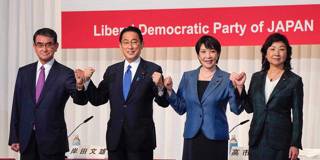The winner of the Liberal Democratic Party’s presidential race this month will succeed outgoing LDP leader and Japanese Prime Minister Yoshihide Suga. And while party leadership contests usually are subject to the uncertainties of factional politicking, there is good reason to think that this time will be different.
TOKYO – Last month, I wrote, “Unless [Japanese Prime Minister Yoshihide] Suga acts quickly, more lives will be lost, and his own political position may become yet another victim of the virus.” This has now come to pass.
On September 3, Suga announced that he will not seek re-election as president of the Liberal Democratic Party in its leadership election on September 29. Because the LDP holds a majority in the House of Representatives (with its coalition partner, the Komei Party), its next leader will automatically become the new prime minister. The LDP leadership election will then be followed by a general election in October or November, when the current four-year parliamentary term expires. Because the LDP is most likely to win the election, the leader it selects this month will become prime minister for the next term.
Suga’s tenure as prime minister will have lasted only around a year. The announcement of his departure spurred a sharp increase in stock prices, with the Nikkei 225 rising more than 2% on the day and maintaining an upward trend ever since. Markets previously had given significant weight to the possibility of Suga hobbling on as a weak prime minister and losing this fall’s general election and the Upper House election next July. Now that this scenario has been eliminated, the market is reacting positively, despite the uncertainty about Suga’s successor.

TOKYO – Last month, I wrote, “Unless [Japanese Prime Minister Yoshihide] Suga acts quickly, more lives will be lost, and his own political position may become yet another victim of the virus.” This has now come to pass.
On September 3, Suga announced that he will not seek re-election as president of the Liberal Democratic Party in its leadership election on September 29. Because the LDP holds a majority in the House of Representatives (with its coalition partner, the Komei Party), its next leader will automatically become the new prime minister. The LDP leadership election will then be followed by a general election in October or November, when the current four-year parliamentary term expires. Because the LDP is most likely to win the election, the leader it selects this month will become prime minister for the next term.
Suga’s tenure as prime minister will have lasted only around a year. The announcement of his departure spurred a sharp increase in stock prices, with the Nikkei 225 rising more than 2% on the day and maintaining an upward trend ever since. Markets previously had given significant weight to the possibility of Suga hobbling on as a weak prime minister and losing this fall’s general election and the Upper House election next July. Now that this scenario has been eliminated, the market is reacting positively, despite the uncertainty about Suga’s successor.